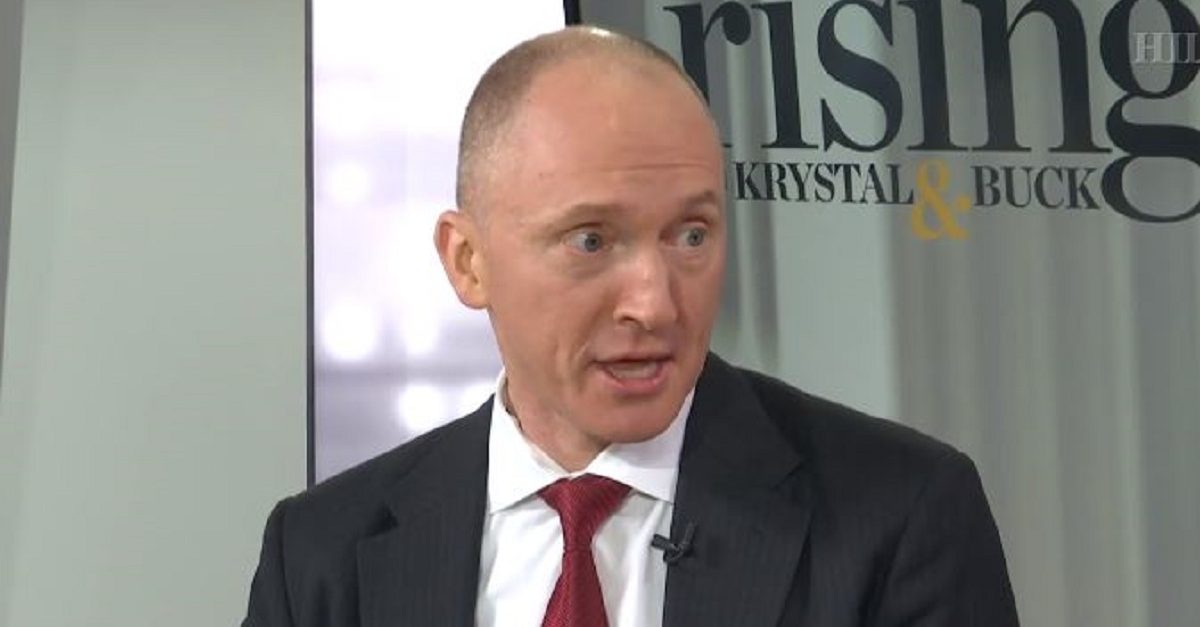
The Carter Page FISA warrant story keeps on chugging along.
Lost amidst most media reports on this issue, though, is that former Trump advisor Page may have been subject to such warrants as early as 2013. Centrist legal blog Just Security notes:
Carter Page came to the attention of the FBI long before he joined the Trump campaign, as the Wall Street Journal and other news outlets have reported. In 2013, Russian spies tried to recruit Page as an intelligence source, and Page passed documents to an agent of Russia’s Foreign Intelligence Service. In discussing the Oct. 2016 FISA warrant, the WSJ says, “It isn’t clear whether the department had previously requested a FISA warrant on Mr. Page.”
That last-quoted sentence above is from a February 1, 2018 article. But it doesn’t appear to be strictly true–at least not now.
A CNN article published on August 4, 2017 notes, “Page had been the subject of a secret intelligence surveillance warrant since 2014, earlier than had been previously reported, US officials briefed on the probe told CNN.” So, that’s an allegation from roughly six months prior, but the WSJ‘s reporting acumen isn’t strictly the point here–and maybe they just didn’t trust CNN’s anonymous sources. Fair enough. But immediately after said WSJ report ran, the floodgates on those prior warrants opened up.
On February 2, 2018, Representative Raja Krishnamoorthi (D-IL) issued a report from his congressional office noting, “The Nunes Memo specifically focuses on the most recent warrants for surveillance of Carter Page, who has reportedly been under watch for his potentially illicit relationship with the Russian government since 2013.”
That same day, the New York Times also noted:
In accusing the F.B.I. of omitting important information, this memo’s critics say the memo itself omits crucial context: other evidence that did not come from Mr. Steele, much of which remains classified. For example, it makes no note of the fact that Mr. Page attracted the F.B.I.’s interest in 2013, when agents came to believe that Russian spies were trying to recruit him. The F.B.I. obtained a FISA wiretap order then, as well, according to a person familiar with the matter.
Two days after that, on February 4, TIME ran a story with the following line, “According to published reports, the FBI obtained a first FISA warrant to eavesdrop on Page’s electronic communications during 2013.” As Ryan Goodman‘s Just Security article clarifies, however, the TIME story links to a Washington Post story which doesn’t currently reference the 2013 FISA warrant.
Also on February 4, Jake Tapper said, “In 2013, 2014, Carter Page was spied on by the FBI in a different FISA warrant.”
The next day, on February 5, CNN’s Jessica Schneider said, “In 2014, the FBI began surveilling Page’s communications under a FISA warrant.”
Later that month, Representative Patrick Lynch (D-MA) told far-right outlet World Net Daily, “The first warrant on Carter Page went back to 2013. He had been surveilled back then as a possible Russian agent. FBI had the evidence. That may have had some influence on the court.”
All of the above examples are instances of the 2013 (and/or 2014) FISA warrant being mentioned by the media. This is true. But as Goodman reiterates in his piece, “If a FISA warrant was issued to surveil Page back in 2013 or 2014, it would add a meaningful piece to analyses of the FBI and courts’ actions in 2016 and 2017.” And the fact remains that references to the 2013 (or 2014) warrant(s) are few and far between.
In other words, this is all fairly crucial information–and it stands to reason that the existence of prior-year FISA warrants likely had substantial bearing on the issuance of the latest Page FISA warrants. For some reason, the existence of those prior-year FISA warrants hasn’t much been mentioned when attempting to account for the 2016 and 2017 FISA warrant applications.
A closely related and ancillary point: the 2013/2014 FISA warrant information has been studiously ignored by critics of the surveillance conducted against Page and the broader Trump campaign. Without a lecture on intellectual honesty, it’s at least worth wondering why this is the case.
[image via screengrab/The Hill]